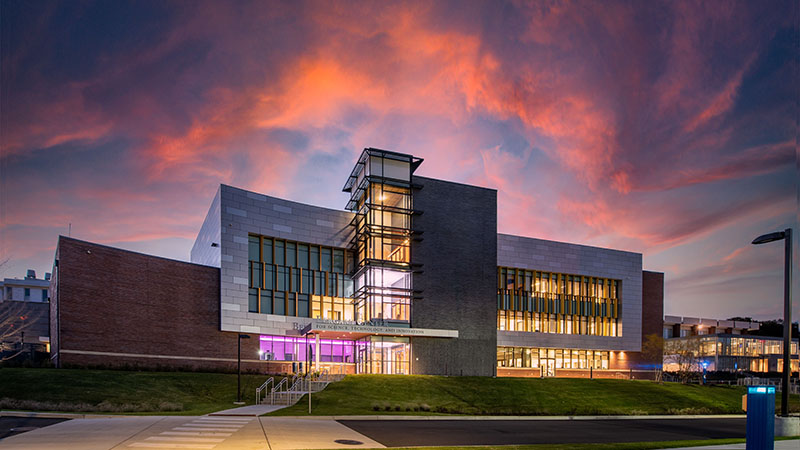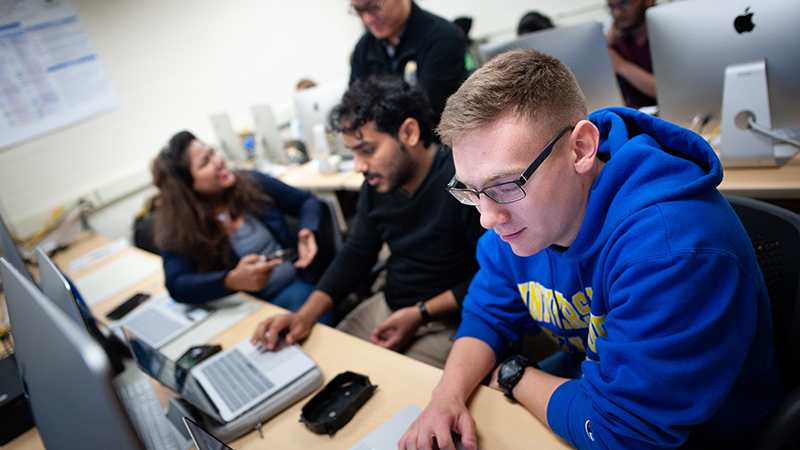To meet the rapidly growing demand for AI expertise, the University of New Haven’s new MS in Artificial Intelligence will emphasize hands-on learning, ethics, and the development of trustworthy AI systems.
October 8, 2025
Artificial intelligence is transforming nearly every sector of society, from healthcare and insurance to advanced manufacturing. Recognizing this, the University of New Haven is preparing to launch a Master of Science in Artificial Intelligence (AI) in spring 2026, with the goal of training the next generation of engineers and developers who will lead this rapidly and ever-evolving field.
“The demand for AI expertise is increasing across all sectors, creating significant opportunities for skilled professionals,” said Vahid Behzadan, Ph.D., coordinator of the new program. “There is a huge demand in the job market for AI engineers and AI developers, especially here in Connecticut.”
Dr. Behzadan explained that while the university already has a successful master’s program in data science, the pace of change in AI required a separate, specialized program. “It has become clear to us that a separate training program specifically focused on developing and developing AI tools is not only attractive, but also increasingly important,” he said.
The new program will be offered both on-site and fully online, making it accessible to students both locally and globally. Ardiana Sula, Ph.D., associate professor of practice in data science & computer science and co-coordinator of the program, emphasized that the timing of this launch is deliberate. “We live in the age of AI, and the future will depend on experts who can drive insights, innovation and transformation in every sector,” she said. “At the University of New Haven, we prepare those leaders.”
According to Dr. Behzadan, what sets the University of New Haven program apart is its dual focus on fundamental knowledge and real-world application. “Our program lays a strong foundation in the core principles of AI while equipping students with skills that will remain relevant as the field evolves – not only for today’s technologies, but also for future generations of AI,” he said.
Students will gain hands-on experience developing AI applications using industry-standard tools and infrastructure, working with both classic and advanced technologies. Just as importantly, the curriculum emphasizes trustworthiness and reliability, important considerations in the ethical use of AI.
“The safety and security dimension of artificial intelligence is explicitly integrated into every course,” said Dr. Behzadan. “We also offer special courses that focus on the reliability, reliability and safety of AI tools and techniques.”
Ethics play an important role in the entire program. “The curriculum emphasizes ethics and responsibility, preparing students to design AI systems that are trustworthy, reliable and socially responsible,” explains Dr. Behzadan out.
“This is something that we consider essential and critical to the next generation of the AI talent pool,” he continued.

The curriculum is built around applied learning and collaboration with industry. “All of our courses are project-based,” says Dr. Behzadan. “Students work on a single ongoing project throughout a course or on multiple projects, gaining hands-on experience in applying the concepts and theory they learn in class.”
Students complete an internship, a capstone project with industry sponsorship, or a two-semester thesis. Each track is designed to prepare graduates for the realities of the workforce.
“For the capstone project, students will work under the supervision of a faculty member as part of a team on a project that is either sponsored directly by industry or developed in collaboration with input from industry partners,” said Dr. Behzadan.
The thesis path, meanwhile, gives students the opportunity to pursue research and development projects with direct guidance from faculty and, often, external input from industry professionals. “The industrial partnership and hands-on experience are at the heart of the program, not the add-ons,” said Dr. Behzadan.
The program is intended for students with a background in computer science, software engineering, or electrical and computer engineering, either through prior academic training or professional experience. The aim is to equip candidates with specialized expertise to develop and maintain AI technologies in various sectors.
Interdisciplinary opportunities are also central to the future of the program. Electives allow students to focus on industry-specific applications, such as AI in healthcare, bioinformatics, advanced manufacturing or engineering management. “Students can take as many of these electives as they want as part of their AI master’s program,” explains Dr. Behzadan out.
Dr. Behzadan expects the program to expand in both reach and focus. “While it is very difficult to predict where we will be in five years, I suspect that the interdisciplinary nature of the program will be further emphasized,” he said. “The emphasis on reliability and verification of the reliability and robustness of AI systems will become increasingly important.”
The program aligns with the university’s broader commitment to AI innovation, including the upcoming Center for Innovation and Applied Technology, a 130,000-square-foot facility adjacent to the West Haven campus. The new MS in AI program builds on the university’s established reputation in AI research and its leading role in Connecticut’s technology sector.
The university’s AI expertise extends beyond the classroom. Dr. Behzadan is a co-founder of the Connecticut AI Alliance and a regular contributor to AI policy discussions at the state level. Faculty across the program lead active research labs that publish regularly in top AI venues.
“Our research groups are at the forefront of AI innovation, with recent PhDs already contributing to core areas of artificial intelligence,” said Dr. Behzadan. “This research excellence directly enriches the curriculum of our master’s program and ensures that students learn from faculty who are shaping the field.”
Dr. Sula said she sees the program as shaping not only individual careers, but also the broader trajectory of the field. “Our graduates will emerge as the AI leaders of tomorrow, driving innovation in industry, pushing the boundaries of research and contributing to society in meaningful ways,” she said. “They will bring the expertise to push boundaries and the judgment to guide AI toward solutions that have a lasting, positive impact across all industries.”
“AI is all the rage today, and employers large and small will be looking for people who can develop AI tools customized to their own needs,” said Ron Harichandran, Ph.D., dean of the Tagliatela College of Engineering and vice provost for research. “The launch of our new MS in AI program is timely and will prepare the future workforce that employers in Connecticut and the nation will need to leverage the AI revolution.”









